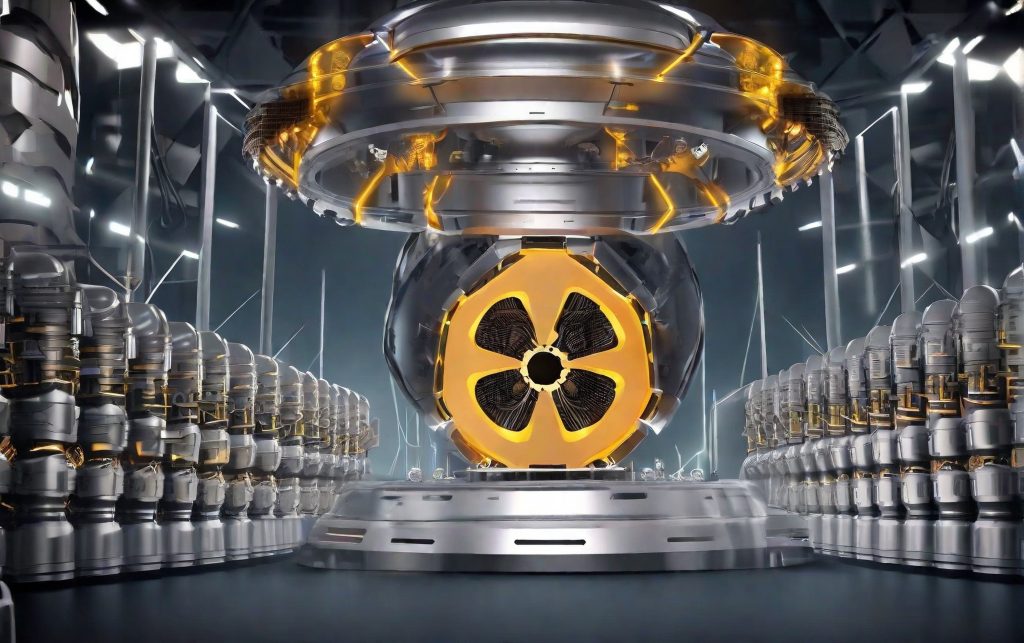Are you ready to explore the exciting advancements in nuclear technologies in 2023? Get ready to witness the transformation of various industries as innovative startups push the boundaries of what is possible. From advanced reactors and nuclear medicine to AI and nuclear-powered propulsion, these developments offer enhanced safety, improved efficiency, and reduced environmental impact. Discover how nuclear technology is revolutionizing semiconductor devices and waste management, contributing to the circular economy and decarbonization efforts. The future of nuclear energy looks promising, so stay tuned for incredible possibilities.
Advanced Nuclear Reactors and SMRs
In 2023, you will witness significant advancements in the field of advanced nuclear reactors and small modular reactors (SMRs). These advancements have the potential to revolutionize the way we generate decentralized energy. However, public perception and regulatory challenges remain key factors that need to be addressed in order to fully realize the benefits of these technologies.
One of the main focuses of these advancements is on safety. Safety advancements in advanced nuclear reactors and SMRs aim to enhance the passive safety features of these systems, ensuring that they can shut down without operator action or external power sources. This not only minimizes the risk of accidents but also increases public confidence in the technology.
Another important aspect is future scalability. Advanced nuclear reactors and SMRs provide flexibility in coolant options, reduce refueling periods, and can even work with synthetic fuels. This scalability is crucial for meeting the increasing energy demands of the future while minimizing environmental impacts.
Despite the immense potential of advanced nuclear reactors and SMRs, there are still regulatory challenges that need to be overcome. These include licensing and permitting processes, as well as addressing concerns related to nuclear waste management and proliferation risks. By addressing these challenges, we can unlock the full potential of decentralized energy generation through advanced nuclear reactors and SMRs, contributing to a cleaner and more sustainable future.
Nuclear Medicine Innovations
Explore the latest advancements in nuclear medicine, including novel medical isotopes and tools for enhanced imaging and targeted drug delivery.
- Enhanced imaging techniques: Nuclear medicine has seen significant advancements in imaging technologies. Innovations in positron emission tomography (PET) and single-photon emission computed tomography (SPECT) have improved the precision and resolution of medical imaging. These techniques allow for the visualization of specific physiological processes and the detection of diseases at an early stage.
- Targeted drug delivery: Nuclear medicine plays a crucial role in targeted drug delivery. By combining radioactive isotopes with pharmaceutical agents, researchers can develop precision therapeutics that specifically target cancer cells or other diseased tissues. This approach minimizes the side effects associated with traditional chemotherapy and enhances the effectiveness of treatment.
- Medical cyclotrons: Medical cyclotrons are essential for the production of novel medical isotopes used in nuclear medicine. These compact particle accelerators can generate isotopes with short half-lives, enabling real-time imaging and personalized medicine. The production of isotopes such as technetium-99m and gallium-68 has revolutionized diagnostic imaging and cancer treatment.
The advancements in nuclear medicine, including enhanced imaging techniques, targeted drug delivery, and the use of medical cyclotrons, have paved the way for precision therapeutics and improved patient outcomes. These innovations offer new avenues for the diagnosis, treatment, and monitoring of diseases, ultimately leading to more effective and personalized healthcare.
AI in Nuclear Technology
Your understanding and utilization of AI in nuclear technology will revolutionize the industry. AI-driven safety measures have become increasingly important in nuclear facilities, where the potential risks are high. AI algorithms can analyze real-time data from sensors, cameras, and other sources to detect anomalies and predict potential safety issues. This proactive approach enhances the overall safety of nuclear operations.
AI is also making significant contributions to radiation therapy in the medical field. By analyzing patient data and medical images, AI algorithms can assist in treatment planning, ensuring accurate targeting of tumors while minimizing damage to healthy tissues. Additionally, AI applications in material research enable scientists to explore new materials for nuclear reactors, enhancing their efficiency, reliability, and safety.
Furthermore, AI is being utilized for optimizing nuclear power plant operations. Through machine learning algorithms, AI can analyze vast amounts of data to identify patterns, optimize processes, and predict maintenance needs. This leads to improved efficiency and cost-effectiveness in the operation of nuclear power plants.
Lastly, AI is playing a crucial role in nuclear waste management. AI algorithms can assist in identifying the most appropriate methods for the disposal and recycling of nuclear waste, ensuring the safe and sustainable management of these materials. By automating and optimizing waste management processes, AI minimizes the environmental impact and maximizes resource utilization.
Nuclear Technology in Semiconductors
AI algorithms revolutionize the nuclear industry by enhancing safety measures, improving radiation therapy, optimizing power plant operations, and managing nuclear waste, and now it’s time to delve into the subtopic of Nuclear Technology in Semiconductors.
- Nuclear powered semiconductors: Startups are leveraging nuclear technology to develop semiconductor devices used across industries. These semiconductors are powered by nuclear technology, which enhances their efficiency and performance.
- Nuclear technology in electronics: Advancements in nuclear technology enable the development of semiconductor devices used in various electronic applications. These devices benefit from the power and reliability provided by nuclear technology, enhancing their functionality and durability.
- Semiconductor advancements in nuclear: Nuclear technology contributes to the development of advanced semiconductor materials. Startups are utilizing nuclear-powered propulsion systems for semiconductor devices, increasing their workability in harsh or dangerous environments. These advancements in semiconductor technology are crucial for various industries, including aerospace and maritime applications.
Nuclear-Powered Propulsion Technology
Nuclear-powered propulsion technology continues to advance in 2023, offering enhanced efficiency and reliability for various applications. Startups are at the forefront of developing nuclear-powered propulsion systems, leveraging the benefits of nuclear technology for both space and maritime operations. These advancements in nuclear propulsion hold great potential for revolutionizing the way we explore space and navigate our oceans.
In the realm of space exploration, nuclear-powered propulsion systems enable longer missions and faster travel. By harnessing the immense energy generated by nuclear reactors, spacecraft can reach distant celestial bodies more efficiently. Nuclear propulsion advancements also provide the necessary power for deep space missions, allowing for extended stays and increased scientific research capabilities.
In the maritime industry, nuclear-powered propulsion offers significant advantages over traditional fuel sources. Nuclear-powered propulsion systems provide a constant and reliable source of energy, eliminating the need for frequent refueling. This enhanced efficiency allows for longer voyages and increased operational capabilities. Additionally, nuclear propulsion systems produce zero greenhouse gas emissions, making them a more environmentally friendly option for maritime transportation.
Nuclear Waste Management and Recycling
To effectively manage and recycle nuclear waste, it is crucial to implement innovative and sustainable solutions. As advancements in nuclear technologies continue to evolve, the focus on nuclear waste management and recycling has become increasingly important. Here are three key areas that highlight the current efforts and advancements in this field:
- Nuclear waste disposal methods: Researchers are exploring new techniques for the safe and efficient disposal of nuclear waste. This includes deep geological repositories, where waste is stored deep underground in stable geological formations, and engineered barrier systems that prevent the release of radioactive materials.
- Radioactive waste recycling: Sustainable waste management involves the recycling and reprocessing of radioactive materials. This not only reduces the volume of waste but also allows for the recovery of valuable resources, such as plutonium and uranium. Advanced recycling technologies, like pyroprocessing and partitioning, are being developed to improve the efficiency and safety of the recycling process.
- Circular economy solutions: The concept of a circular economy aims to minimize waste and maximize resource utilization. In the context of nuclear waste management, this means finding ways to reuse and repurpose waste materials. For example, some startups are exploring the use of radioactive waste in construction materials or as a source of heat for industrial processes.
Global Interest and Investment in Nuclear Energy
As advancements in nuclear technologies continue to evolve, global interest and investment in nuclear energy are growing rapidly. The pursuit of sustainable nuclear energy has gained traction as countries recognize its potential to address key challenges such as climate change, economic growth, and job creation. Governments around the world are formulating nuclear energy policies that promote the development and deployment of advanced nuclear reactors. These reactors offer improved safety features, modular designs, and integration with renewable energy sources, making them an attractive option for clean and affordable energy production.
Nuclear energy has emerged as a crucial component in the fight against climate change. With its low carbon emissions and high energy density, nuclear power can help reduce reliance on fossil fuels and transition to a low-carbon economy. Moreover, the nuclear industry has the potential to drive economic growth by creating new jobs and stimulating innovation. As countries invest in nuclear energy infrastructure, they can leverage the expertise and resources of the nuclear industry to foster technological advancements and drive economic development.



